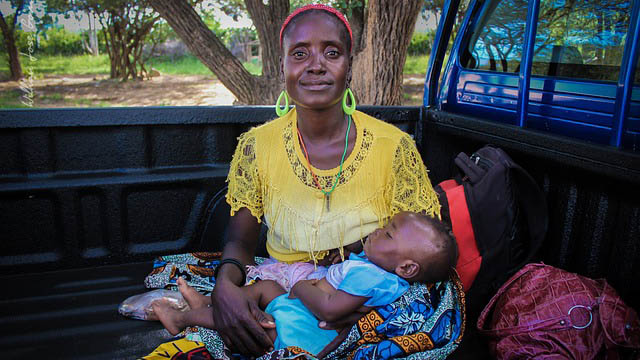High-income western countries, including the US, are mostly responsible for climate change but don’t bear its brunt. People who make the least contribution to the crisis are the greatest hit, with 91% of preterm deaths of babies related to air pollution taking place in low and middle-income nations in the Global South, states a recent United Nations agencies’ report.
The recently published ‘Born Too Soon: Decade of Action on Preterm Birth’ report released by the World Health Organization (WHO), UNICEF and Partnership for Maternal New Born and Child Health (PMNBCH) brings forth numerous adverse impacts of climate change—direct and indirect—on pregnancy, leading to stillbirths, preterm birth or death and low-weight for gestational age in the Global South.
According to experts, climate change impacts pregnancy through exposure to heat, storms, drought, floods, wildfires and air pollution apart from food insecurity, food and/or waterborne diseases, vector-borne diseases, conflict, migration, and health system resilience, which are common in the Global South.
The report recommends more investment to specifically mitigate risks and increase attention on women and infants in policies and programmes related to the climate emergency.
Six million preterm births each year contribute to air pollution. “As recent research from the IPCC and others have pointed out, vulnerability to climate change is a multi-dimensional, dynamic phenomenon shaped by intersecting historical and contemporary political, economic and cultural processes of marginalisation. Societies with high levels of inequity are less resilient to climate change”, stated Dr Ana Bonell from the Medical Research Council Unit The Gambia at the London School of Hygiene & Tropical Medicine (MRCG at LSHTM).
The report estimates climate change has a harmful impact during the perinatal period. It heightens the preterm birth risks by direct pathways, such as air pollution due to burning fossil fuels, which accelerates risk by 52% in asthmatic mothers; extreme heat exposure heightens risk by 16% and numerous other extreme weather conditions, such as drought.
The report states, “Although the impacts of climate change are being felt in all areas of the world, the people most affected have contributed least to the crisis. For example, globally, 91 per cent of deaths of preterm babies related to air pollution occur in low and middle income countries, while high income countries make the greatest contribution to climate change (sic).”
Recent estimates suggest that household air pollution contributed to 15.6% of small gestational age and 35.7% of all preterm births, visibly in low-income countries of the Global South.
A study conducted on 92 pregnant women in the Gambia led by Dr Bonell highlighted that every extra degree Celsius in extreme heat stress leads to a 17% increase in strain on the foetus, specifically by accelerating fetal heart rate and slowing blood flow via the umbilical cord.
Another study showed a macro-level correlation between climate change vulnerability and women’s and children’s health (WCH) in the Indian districts. This association at the district level in India showed districts with high levels of climate change vulnerability also performed poorly in WCH parameters.
Dr Bonell said, “Climate change impacts pregnancy in women through both direct and indirect pathways. The common direct pathways include heat exposure, storms, floods, drought, wildfires and air pollution. Indirect pathways include food insecurity, water or foodborne diseases, vector-borne diseases, migration, conflict and health system resilience.”
Despite the growing evidence connecting the harmful effects of climate change on maternal and newborn health, its impact continues to remain politically under-appreciated in low-income countries, the report showcased. Moreover, the West has shunned any responsibility towards these countries and their women and children, who suffer due to its actions that lead to climate change.
Pregnancy and newborn health are often under-prioritised compared to other health concerns. Harmful impacts of the environment on maternal and newborn health have rarely drawn the attention or resources of policy-makers and implementers.
Dr Anshu Banerjee, the director of the Department of Maternal, Newborn, Child and Adolescent Health and Ageing at the WHO, during a speech at the first biennial International Maternal Newborn Health Conference (IMNHC) hosted by the Government of South Africa and AlignMNH in Cape Town, urged governments to start a dialogue with representatives of women and community groups, health workers associations, and other stakeholders to address and identify their requirements, focusing on a myriad of behavioural, policy, health systems, health and environmental solutions.
Dr Banerjee highlighted that the health sector needs to play a double role by developing intrinsic climate resilience by decreasing greenhouse gas emissions. At the same time, this transition is not to come at the cost of the quality of care, and patients’ and health workers’ health and wellbeing.
Considering that women and vulnerable newborns are at risk from vatted approaches, the report said government and multi-partner efforts must undermine the compartmentalisation between sectors.
However, low-income countries that lack resources often fail to take coordinated efforts to expand their healthcare support for women and newborns, which aggravates the problem. As long as the West continues to evade its responsibility towards the menace it has created, there are fewer hopes for a complete turnaround.



